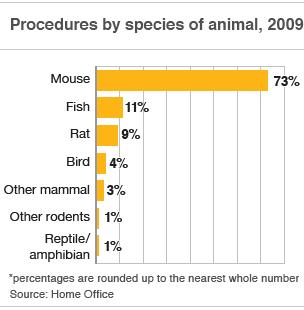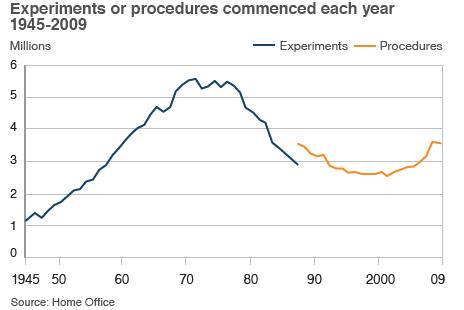Experiments with genetically modified animals increase
- Published

The total number of scientific procedures on animals has decreased slightly
The number of scientific procedures involving genetically modified animals has overtaken those involving "normal animals" for the first time.
A Home Office report revealed that more than 3.6 million scientific procedures involving animals were carried out in the UK during 2009.
Of these, just 48% involved genetically "normal" animals.
The total number of procedures carried out using normal animals decreased slightly.
Scientists say that genetically modified animals, or those with so-called "harmful mutations", are the best models to understand many humans diseases.
Professor Allan Bradley, director emeritus of the Sanger Institute, near Cambridge, UK, said the use of GM mice, rats and fish was likely to continue.
"GM is a tool that we can use to discover the function of a single gene in a mouse or rat or fish," he explained.
"That knowledge can be directly translated into humans - we essentially have the same genes."
The annual report, called Statistics of Scientific Procedures on Living Animals, external, also showed an 1% decrease in the total number of procedures in 2009 compared to 2008.
This was primarily a result of a dramatic reduction in the use of fish, which was down by 34%.
But the slight drop in the total number of procedures was described by Dr Jon Richmond, head the Home Office animals scientific procedures division, as a "blip".
He added that it was likely that the general upward trend in procedures would continue - driven largely by the continued increase in the use of genetically modified mice, rats and fish.
A "procedure" is defined as an experiment on an animal, or the breeding of a genetically modified animal. This definition was introduced as an addition to the 1986 Animals (Scientific Procedures) Act, which covered only scientific "experiments" and did not include these GM breeding programmes.
The report also showed a sharp reduction in the number procedures to test drugs, which was down 10% on the previous year.
This may be because pharmaceutical companies are investigating fewer potential drugs. It could also be the case that the industry has invested in alternative methods of drug testing that does not involve animals.
'Shameful legacy'

The figures were condemned by animal welfare groups.
Barney Reed, senior scientist for the RSPCA said: "The public is repeatedly told that animals are only used where absolutely necessary and that the UK has the tightest regulations in the world.
"It is difficult to reconcile these statements with today's news that more scientific procedures are being carried out on animals in the UK now than at almost any time since the current laws on animal experiments came into force more than 20 years ago."
The British Union for the Abolition of Vivisection said the figures were "disappointing". Chief executive Michelle Thew said: "The UK should be leading the way in reducing animal testing. Unfortunately, these latest statistics show there is a long way to go.
"Millions of animals continue to suffer and die in UK laboratories. We welcome the pledge from the new coalition government to work to reduce the use of animals in scientific research and we look forward to working with it to make meaningful and lasting change."
The Humane Society International described the figures as "a shameful legacy of science's complacency about animal suffering".
Responding to the criticism from animal welfare groups, Professor Robin Lovell-Badge, from the National Institute for Medical Research said: "The UK is leading the way to reduce and refine animal experiments."
"[These groups] should try to obtain data from other countries before they make such statements."
